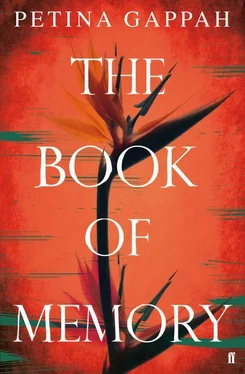That day, when I went home to Lloyd, he said to me, ‘It is your choice, Mnemosyne. You can spend your life feeling sorry for yourself, or you can simply choose not to. You can invite people’s pity or you can refuse to be an object.’
Lameck in Mufakose had no Lloyd or Sister Mary Gabriel to tell him of the wondrous origins of his name, or to spend money at the dermatologist’s and buy creams and lotions with sun filters, as Lloyd did for me after he bought me, ointments that healed and mended my skin.
I wanted to believe that I did not look to others as Lameck looked to me. He looked incomplete, as though he had been fashioned at mahumbwe play by a careless child, and then been fought over before being abandoned to be stamped on as the children hurried in to their suppers.
Like Lameck’s, my skin often blistered, but it was never as bad as his. My father made me wear a large grey school hat, and he made me wear it everywhere. Consequently I did not have the protuberant pustules that Lameck had all over his face.
On Mharapara Street, I had a torrid time of it, but at school, where children from other streets in Mufakose joined the children of my street, the tormenting reached unbearable levels.
Nhau and his gang ran up to me to form a cordon beyond which they hissed at me and shouted or laughed. I was at least lucky in one respect — they never touched me. In grade two, when we had first moved to Mufakose, a boy had slapped me in the face. If my skin had been like the others’, the slap would not have left a visible mark, but because of the absence of colour in my skin, his hand had left its outline on my face.
From this incident had come the children’s fear, and the saying that ukamurova anotsvuka ropa — if you hit her, they said, her blood rises to the surface. So no one touched me.
Once inside, I could get my revenge on the children who hissed and called out to me when I walked outside. In here, I could humiliate them by showing them that a murungudunhu like me had better brains than them.
Had it not been for my condition, I would have been every teacher’s dream. I sat quietly in class, in the front of the room, where my father insisted to my teachers that I sat. I was not one of those children who eagerly put their hands in the air and yelled, ‘Mistress, mistress, mistress’, but when called upon to answer a question, I always knew the answer. I was quiet and watchful, and my report every term spoke of a one hundred per cent pass rate in every subject.
I longed to be like all the others. I tried to get as dark as the other children. I longed to belong. I felt a sharp and burning envy of everyone I saw. I sought out obsessively the children with flaws. I would have given anything to be Nhau, who had a slash across his face. Lavinia walked with a limp. The grade four class had cast her as a cripple in their end-of-year play, and she had added a gritty sense of realism as she walked on the stage, exaggerating her limp as she moaned, ‘Ini zvangu mushodogo, hee mushodogo.’ Whizi was cross-eyed; it was never clear if he was looking at you or not. Never, who was tall as a man but still played in the street with the children, and who talked out of the corner of his mouth, was given the nickname Drunken.
I would have taken Whizi’s eyes, and Lavinia’s limp, and added to it Nhau’s scar and Drunken’s speech, only to have some colour in my skin.
I prayed every second I could for God to darken my skin. After Reverend Bergen said, ‘Ask anything of me, says the Lord’, I redoubled my prayers. I made all sorts of bargains, made promises about being good, about coming top in class. I promised not to slap Mobhi, and I even vowed not to hate my mother. But my skin remained what it had always been.
Religion having failed me, I turned to science. When my father was not looking, I sat in the sun and wished for my skin to darken. It only made my skin red and sore and blistered. I noted obsessively the different shades of the skins on my family.
My father was dark brown.
My mother had a smooth, light caramel complexion that was almost the same colour as her feet. Joyi looked like her, but it seemed to me that, in me, my mother’s skin had lightened to the point of disappearance. The lightness of skin that made my mother and my sister beautiful had been bleached to the point of distortion in me. I was just three, possibly four, shades away from beauty.
I tried my mother’s Pond’s Foundation Cream, and her face powder, the same caramel as her skin. Its brown colour lay invitingly in its blue compact plastic case, and I smeared and smeared it all over my face until I realised that I would need more than one compact to cover my hands and arms. I hid the evidence of my attempt, and washed the cream away from my face.
Over and over again, I ran my fingers over the faces of the women in my father’s Parade magazine. Joyi liked Parade because of Max Eagle, the private detective with gravity-defying karate kicks, but more absorbing to me were Caroline Murinda and Sarah Mlilo, the two Miss Luxes who advertised Lux Beauty Soap. I stared for hours at Caroline Murinda’s cream dress, and the yellow belt that matched her yellow hat. I was dazzled by Sarah Mlilo’s neat Afro hair and by her slim fingers making a chord on her shining guitar. But most of all, I was drawn to the radiant beauty of their brown skin. ‘She cares for her beautiful complexion with Lux Beauty Soap’ said the captions below their smiling faces.
I believed that my skin could be as beautiful as theirs if only my mother bought Lux instead of Choice or Geisha soap. I even thought of stealing from my mother’s purse so that I could buy the soap that would cure all my problems. Or perhaps it was not Lux, but Cleartone that I needed. If I could not be like the others I would be invisible. To befriend someone like me would defeat that desire to disappear, to melt and only observe, and so I ignored Lameck, because to acknowledge him was to see that in myself which I would rather not have been.

There is a Psalm Sister Mary Gabriel loved that also forms the basis for a supplication in the Book of Common Prayer. ‘Let me know, oh Lord, my life’s ending,’ it goes, ‘and the measure of my days. Let me know how frail and fleeting my life is. You have made my life a mere handbreadth. Each man’s life is as a breath to you.’
She wanted us, she said, to know that our days in this life were numbered, that we were mere blinks in the life of the universe, and that our lives should have a purpose. ‘A life without a purpose, girls,’ she often said, ‘is like a needle without a point.’
Sister Mary Gabriel was not blessed with either felicity of expression or originality of thought. ‘And what,’ she often asked, ‘is God’s telephone number?’
‘Jeremiah thirty-three verse three,’ we chanted in unison.
‘That’s right, girls,’ she would say, her face beaming. ‘“Call to me and I will answer you.”’
Poor, sweet Sister Mary Gabriel, with her nine types of angels, her cherubim and seraphim, her thrones and dominions. Her Christianity did not have the formal stamp of Rome’s approval — it was based entirely on the non-approved gospels, with a dash of Milton thrown in for good measure. She told us stories from the Apocrypha, from the Gospel of Nicodemus and the Book of Judith, stories about the boy Jesus moulding pigeons and blowing life into them so that they flew high in the sky like the first birds on the fifth day.
Instead of doing what she was most temperamentally suited for — founding a religion in some backwater, like my mother’s Reverend Reiner Bergen, or standing at street corners thundering the more stirring passages of Amos and Hosea — it was poor Sister Mary Gabriel’s lot to be a sister at the Convent, with its deadening self-effacement livened only by teaching girls with reedy voices to strum-strum-strum on cheap guitars in accompaniment to songs of saccharine banality. D change to A, A change to G, G change to D. One-two-three, one-two-three. Bind us together Lord; bind us together with cords that cannot be bro-o-ken.
Читать дальше













